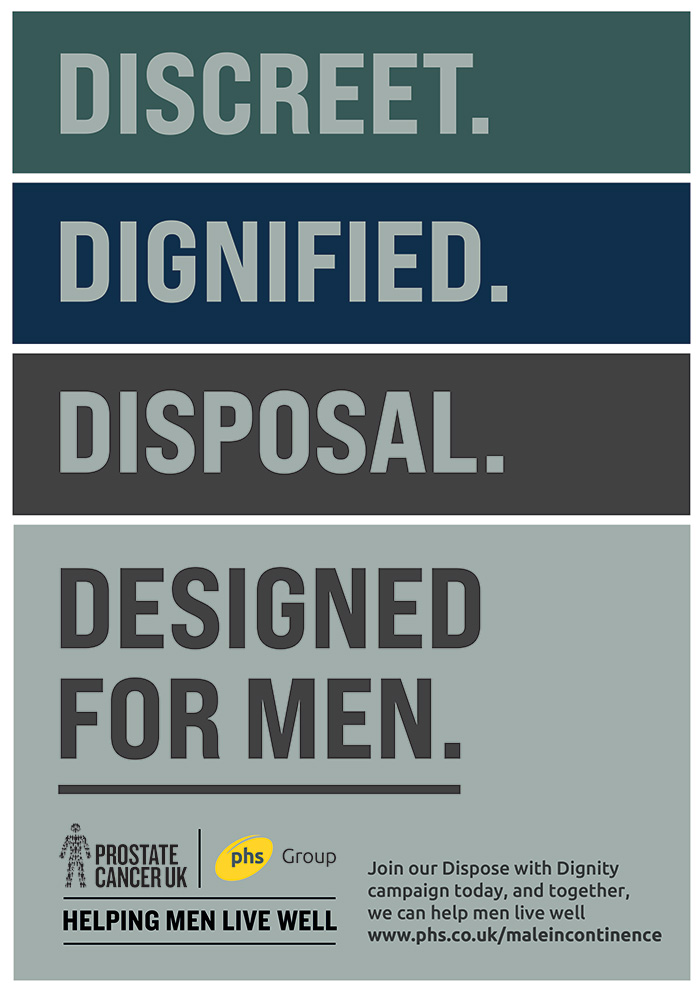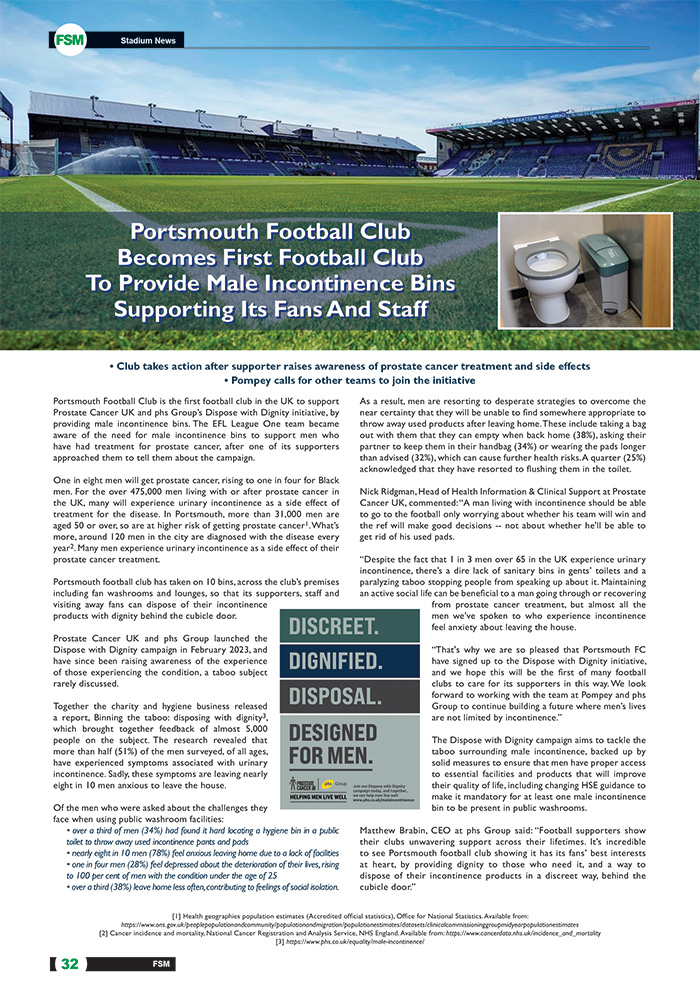Portsmouth Football Club Becomes First Football Club To Provide Male Incontinence Bins Supporting Its Fans And Staff

- Club takes action after supporter raises awareness of prostate cancer treatment and side effects
- Pompey calls for other teams to join the initiative
Portsmouth Football Club is the first football club in the UK to support Prostate Cancer UK and phs Group’s Dispose with Dignity initiative, by providing male incontinence bins.
The EFL League One team became aware of the need for male incontinence bins to support men who have had treatment for prostate cancer, after one of its supporters approached them to tell them about the campaign.
One in eight men will get prostate cancer, rising to one in four for Black men. For the over 475,000 men living with or after prostate cancer in the UK, many will experience urinary incontinence as a side effect of treatment for the disease.
In Portsmouth, more than 31,000 men are aged 50 or over, so are at higher risk of getting prostate cancer.1

Portsmouth football club has taken on 10 bins, across the club’s premises including fan washrooms and lounges, so that its supporters, staff and visiting away fans can dispose of their incontinence products with dignity behind the cubicle door.
Prostate Cancer UK and phs Group launched the Dispose with Dignity campaign in February 2023, and have since been raising awareness of the experience of those experiencing the condition, a taboo subject rarely discussed.
Together the charity and hygiene business released a report, Binning the taboo: disposing with dignity, which brought together feedback of almost 5,000 people on the subject. The research revealed that more than half (51%) of the men surveyed, of all ages, have experienced symptoms associated with urinary incontinence. Sadly, these symptoms are leaving nearly eight in 10 men anxious to leave the house.
Of the men who were asked about the challenges they face when using public washroom facilities:
- over a third of men (34%) had found it hard locating a hygiene bin in a public toilet to throw away used incontinence pants and pads
- nearly eight in 10 men (78%) feel anxious leaving home due to a lack of facilities
- one in four men (28%) feel depressed about the deterioration of their lives, rising to 100 per cent of men with the condition under the age of 25
- over a third (38%) leave home less often, contributing to feelings of social isolation.
As a result, men are resorting to desperate strategies to overcome the near certainty that they will be unable to find somewhere appropriate to throw away used products after leaving home. These include taking a bag out with them that they can empty when back home (38%), asking their partner to keep them in their handbag (34%) or wearing the pads longer than advised (32%), which can cause further health risks. A quarter (25%) acknowledged that they have resorted to flushing them in the toilet.
Nick Ridgman, Head of Health Information & Clinical Support at Prostate Cancer UK, commented: “A man living with incontinence should be able to go to the football only worrying about whether his team will win and the ref will make good decisions ‑‑ not about whether he'll be able to get rid of his used pads.
“Despite the fact that 1 in 3 men over 65 in the UK experience urinary incontinence, there’s a dire lack of sanitary bins in gents’ toilets and a paralyzing taboo stopping people from speaking up about it. Maintaining an active social life can be beneficial to a man going through or recovering from prostate cancer treatment, but almost all the men we've spoken to who experience incontinence feel anxiety about leaving the house.
“That's why we are so pleased that Portsmouth FC have signed up to the Dispose with Dignity initiative, and we hope this will be the first of many football clubs to care for its supporters in this way. We look forward to working with the team at Pompey and phs Group to continue building a future where men’s lives are not limited by incontinence.”

Matthew Brabin, CEO at phs Group said: “Football supporters show their clubs unwavering support across their lifetimes.
“It’s incredible to see Portsmouth football club showing it has its fans’ best interests at heart, by providing dignity to those who need it, and a way to dispose of their incontinence products in a discreet way, behind the cubicle door.”

Top image credit: Portsmouth Football Club.
1: Health geographies population estimates (Accredited official statistics), Office for National Statistics. Available here.
2: Cancer incidence and mortality, National Cancer Registration and Analysis Service, NHS England. Available here.












































